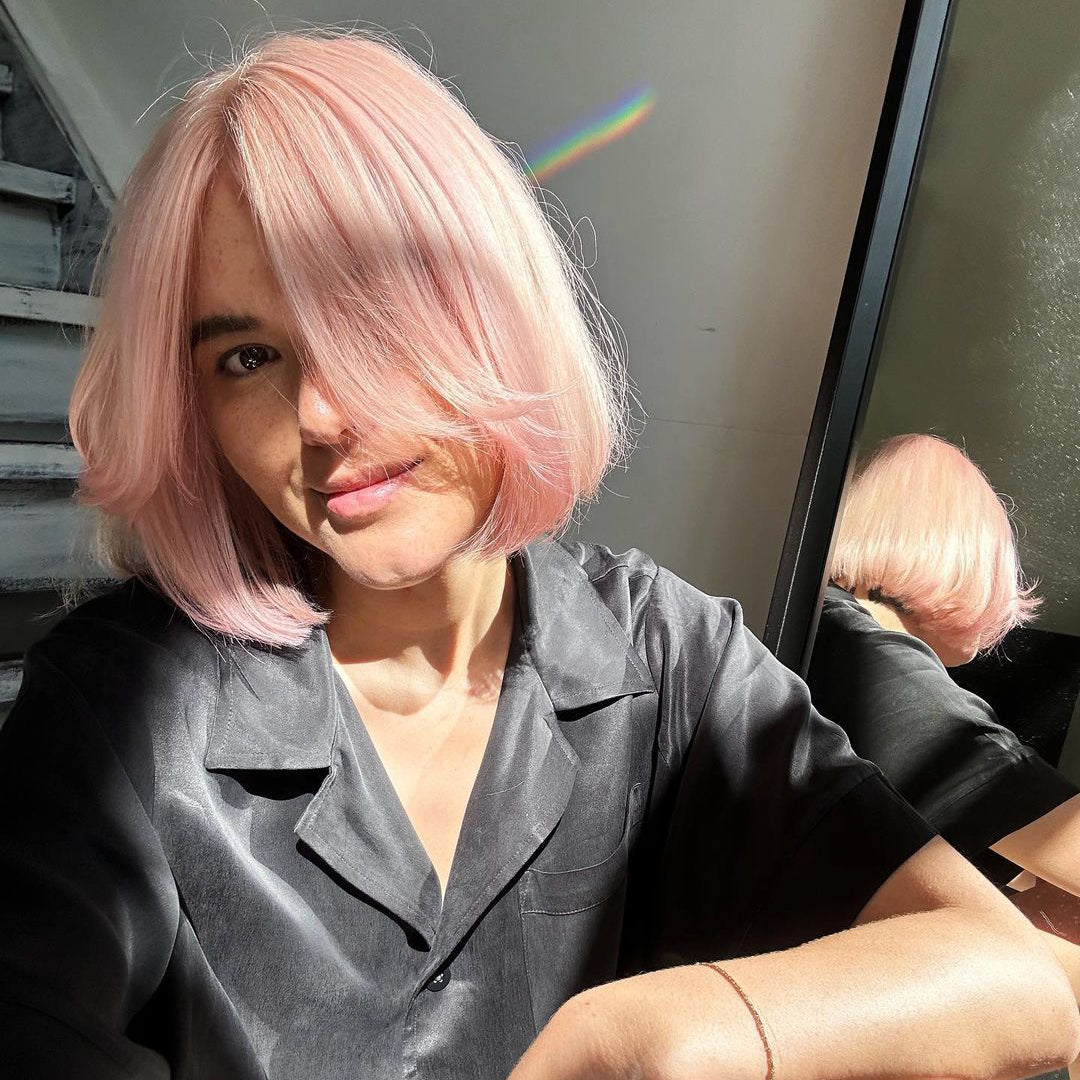And whilst there’s no cure-all (yet!) for this mofo of a condition, there are some ways in which you can make living with it a little easier. Whether you're an endo-warrior yourself or you know one (likely!), here are some important things to know...
WHAT IS ENDOMETRIOSIS?
Endometriosis (a.k.a. ‘endo’) is a condition whereby tissue that is similar to the lining of the uterus (a.k.a. the endometrium – the layer that is usually shed each month when you menstruate) grows outside of the uterus, in other areas around the body.
Endometriosis can cause mild to excruciating pain, predominantly in the pelvic area and in some cases, it can even lead to other conditions like vaginismus and infertility.
Endo is classified into four stages: I or ‘stage 1’ (minimal), II or ‘stage 2’ (mild), III or ‘stage 3’ (moderate) and IV or ‘stage 4’ (severe). Every person's experience will be different and the ‘stage’ of Endo you have isn’t necessarily related to the level of pain or other associated conditions you might experience.
WHO DOES ENDOMETRIOSIS AFFECT?
Endo can occur in any person of any age who experiences a menstrual period and approximately 11% of Aussie women* will suffer from the condition at some point in their lives.
Although people usually start experiencing symptoms in their tween or teenage years, most cases are diagnosed when people are aged 25 – 35yo. According to healthline.com your risk of endo is 7 – 10 times higher if you have a family history of it, compared to those who don’t have it run in the fam. So whilst it can be hereditary, it’s not a definite that you'll experience it. It's not contagious, either.
*Statistic and classification via Endometriosis Australia – though the condition would affect those who don't necessarily identify as 'women', it is not clear whether or not this is considered in this statistic.
WHAT ARE THE FIRST SIGNS AND SYMPTOMS OF ENDOMETRIOSIS?
Endo symptoms usually present themselves in your tween/teen years (at the onset of menstruation) but can also manifest much later into adulthood and can include:
- Pain. ALL KINDS. For example, during ovulation, just before or during your period, during sex and sometimes, even going to the toilet can be painful. Endo pain is usually felt in the pelvic area but may also refer to your lower back and even your legs, too.
- Heavy or irregular periods
- Moodiness
- Bloating and fluid retention
- Fatigue
- Bowel issues, like constipation, diarrhea or IBS-like symptoms.
A lot of these symptoms are similar to those associated with Premenstrual Syndrome (PMS), which is part of the reason why endometriosis is often misdiagnosed or dismissed as "just bad periods". But it's not normal to experience extreme pain to the point where it's debilitating, and affecting your life, relationships and work. The same can be said for extremely heavy periods. If this is the case for you, it's a sure sign to get checked.
The unfortunate flip-side of this is that you may have endo, but no obvious symptoms at all.
HOW IS ENDOMETRIOSIS DIAGNOSED?
Whilst some Doctors may suggest endometriosis as a diagnosis based on the symptoms you present, an absolute diagnosis is unfortunately more invasive.
The only way (currently) to properly diagnose endo is by undergoing a surgical procedure, usually under general anaesthetic, known as a laparoscopy; and to have a biopsy taken of the offending tissue to confirm an endo diagnosis.
But not everyone who has or suspects they may have endo will necessarily undergo a laparoscopy; it can be a risky procedure and so it’s best to discuss with your Doctor whether having one, and also whether a firm diagnosis, is essential for you.
HOW IS ENDOMETRIOSIS TREATED?
Unfortunately, there’s currently no cure for endo and as there’s no way to prevent it, it’s all about managing it as best you can. Treatments include:
- A laparoscopy (more on this above), which is a key-hole surgery, performed under anaesthetic, whereby any Endo-containing tissue is removed. Some people may need several surgeries to remove the offending tissue because devastatingly, the tissue can grow back
- Hormonal treatments, like the oral contraceptive pill or an IUD like the Mirena; which are used to suppress the menstrual cycle, in turn slowing the growth of Endo
- Pain medication, like paracetamol or ibuprofen
- Pelvic exercise. A pelvic physiotherapist can help you to relax the pelvic muscles and even the vagina, if you suffer from vaginismus (many Endo-warriors will experience this associated condition, which is an involuntary tightening of the vaginal muscles. Inserting a tampon or having sex can be excruciatingly painful for those with this condition, but there are ways to help manage the symptoms)
- Natural or 'alternative' therapies, which may be complementary to any of the above; like herbal medicine, acupuncture, vitamins, changes in diet (more on that a bit further on) and Chinese medicine. Find whatever works best for YOU
- Hysterectomy (removal of all or part of the uterus). This is a contentious one, given that Endometriosis isn't actually the tissue of the Endometrium, but rather, it's tissue that is SIMILAR to it - we're not medically versed enough (and not Doctors!) to be able to comment on whether removing the uterus, or part of it, is a viable treatment. See your Doctor about this one.
There are lifestyle changes you can make that may also help to alleviate endometriosis-related symptoms, too (detailed a little further on), but any kind of treatment plan should always be discussed with your health practitioner, first.
WHERE AND HOW DOES DIET COME INTO PLAY?
Inflammatory foods, like gluten, dairy, sugar and processed packet foods that are high in fats and preservatives/additives won’t do you or your endo flare-ups any favours. Make sure you drink lots of water, limit those inflammatory-type foods and eat more of the good stuff like anti-inflammatory fruits and vegetable (pineapple, oranges, berries, green leafy vegies) and fatty fish (salmon, tuna or sardines), as well as getting lots of fibre in your diet.
That all said, we’re all about balance; so if some chocolate or scoop of ice-cream is going to help curb your Endo woes, go for it.
THE IMPORTANCE OF SELF-CARE
You know how we feel about self-care here at Moxie; it’s not an occasional indulgence, but an everyday affair! Whilst self-care is a must-do for your mental, physical and emotional wellbeing in general, it’s mission critical if you suffer from debilitating endo symptoms. Here are some simple ways to practice self-care during an endo flare:
- Wear something comfortable. No-one needs a restricted waist-band at the best of times, let alone when your stomach is bloated and crampy af.
- Cancel plans. Sometimes being social, or just out in public, is the last thing on your mid endo flare radar. It’s ok to just not wanna do stuff.
- Rest and recharge. Get to bed early or have a sleep-in if you can. Be gentle on your body and maybe give that PT a miss this week. If you still like to move, try some light-flow yoga or stretching.
- Talk to a therapist. It’s important to have someone you can talk to when things get a bit tough. Also, just generally surround yourself with people who support you and don’t question or belittle your symptoms or experience. Haters, there’s the door, thanks.
- Practice deep-breathing/breathwork or meditation. Short, sharp, shallow breaths can put our body into fight-or-flight mode, which can heighten pain and discomfort, too. Remind your brain (and your body) that it’s in a safe space.
- Do the pamper-y things that make you feel good: take a long bath, curl up under a heated blanket with a book (or the remote, a significant other or better yet, a pet). More on these, below…
HOME REMEDIES FOR ENDO PAIN RELIEF
Some tried-and-tested faves:
- Heat packs – like our Moxie mini hotties or a heated wheat bag, placed on your tummy– are a trusty side-kick during a flare-up. Keep one handy
- Have a warm bath with a few tablespoons of Epsom salt (which can help with pain relief and inflammation)
- Boil up a pot of tea. Peppermint has anti-spasmodic properties and can help with cramps and bloating, whilst chamomile helps reduce inflammation and anxiety
- Take some ibuprofen or paracetamol
- Orgasm! So this one’s not going to be for everyone – some endo warriors find intercourse or masturbation excruciatingly painful, but for others, it can act as a natural pain reliever due to the release of endorphins (the happy hormones!) into the blood-stream, as well as contractions experienced by your uterus during orgasm that help relax the pelvic area.
ENDOMETRIOSIS AND FERTILITY
According to Endometriosis Australia, about 1/3 of women with endometriosis will have fertility issues, though the majority will be able to conceive naturally.
The condition can lead to inflammation, scarring, and adhesions that interfere with ovulation, egg quality, and implantation. In severe cases, it can cause blocked fallopian tubes or distort reproductive anatomy, making natural conception challenging. However, pregnancy is still possible - many people with endometriosis successfully conceive with the right management. Treatment options include surgical removal of endometrial lesions, hormonal therapies to suppress symptoms, and assisted reproductive technologies like IVF.
Early diagnosis and a tailored fertility plan with your healthcare provider can help you explore your options and improve outcomes.
Read more about endo and fertility in our blog post, HERE.
ENDOMETRIOSIS AWARENESS AND EDUCATION IS KEY
With more awareness of conditions like endo comes better understanding and ultimately better treatment for those who are affected. To learn more about Endo, here are some of our go to resources:
- We recommend reading the ultimate guide to all things endometriosis, ‘How to Endo’ by endo-warrior, radio presenter and author, Bridget Hustwaite.
- www.endometriosisaustralia.org
- www.endometriosis.org
- www.endometriosis.net
- There are lots of support groups - from face-to-face meet-ups to online/social forums - find one that works for and best supports your journey.
To anyone experiencing any kind of pain: your symptoms are real and valid. Don’t stop asking questions or seeking advice until you get the answers or treatment you need to help you best manage your condition.
And for anyone else: please be mindful when a pal or colleague tells you they're in pain. Don't be quick to judge if they cancel plans or take some time to themselves. Be supportive as best you can.
Please note that this piece is intended only to be informative, educational and to help further open the dialogue around health conditions that are commonly experienced, but perhaps not as commonly spoken about. It’s not intended to provide specific medical advice or replace any kind of medical advice, diagnosis or treatment plan you may receive from a medical health practitioner.
If you’re suffering from any of the symptoms mentioned, or if you suspect you might have Endometriosis (or, if there’s a family history of it), see a trusted Dcotor; preferably one who specialises in Endometriosis, who can guide you towards a more personalised diagnosis and treatment plan.




